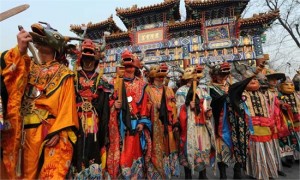I saw a few stories on China today that are thread-worthy and wanted to share.
First of all, this is a story on how China is giving the one-child policy a facelift — not changing the policy itself, but softening its sloganeering. The story made my eyes pop out when I read this:
People’s Daily cites several examples of “harsh slogans,” including those “which sometimes even threaten criminal acts.” The newly instituted program, slugged the “face-washing project,” will offer more proactive slogans to help enforce the policy, which has been in place since 1979. China claims the policy, which applies to those living in urban areas, affects approximately 35.9 percent of the population and has resulted in an estimated 400 million fewer births since first being implemented.
Some examples of the more offensive slogans currently in use include:
“If you don’t receive the tubal ligation surgery by the deadline, your house will be demolished!”
“We would rather scrape your womb than allow you to have a second child!”
“Kill all your family members if you don’t follow the rule!”
And…
“Once you get captured, an immediate tubal ligation will be done; Should you escape, we’ll hunt you down; If you attempt a suicide, we’ll offer you either the rope or a bottle of poison.”
The new less offensive slogans replacing the more callous ones will reportedly seek to “avoid offending the public and stoking social tensions.”
I want to ask my friends in China, is this for real? Is this an example of extreme Western media bias and ignorance, or do these sickening slogans actually exist??
[Update: CDT offers a source. Reliable?]
Next, there’s an interesting blog post on whether or not China is ready for democracy. Yes, we all know this is a tired subject, but this post is quite thoughtful and knowledgeable. I have never said I believed China was ready for democracy, but I do believe it’s ready to become more democratic, to give it’s people better representation (as opposed to giving them Western-style democracy). The post is well worth a read. The government’s position for decades is that the people aren’t ready. Will there ever be a time when they are? Excerpt from the blog post:
As popular blogger Han Han argued at the start of the year, China isn’t ready for democracy, because the people aren’t capable of making their own good decisions (Charlie Custer, from ChinaGeeks.org, wrote an excellent post exploring this particular issue). This idea has been put forth time and again by Party sympathizers, that simply the character of the average laobaixing is too low to make these kinds of decisions (Similar arguments were made in the US around the turn of the century in relation to voting rights for minorities and women).
The part of this argument that I find the most sickening, is that many Chinese are poorly educated and are therefore ill-equipped for democracy. But who is responsible for the current state of China’s educational system? The very people who would lose the most in a democracy.
Given this, it is also worth noting that China’s current system seems incapable of promoting people worthy of public service. With rampant corruption leading to weekly scandals that effect the lives of the laobaixing, what evidence is there that democracy would make things worse? Are farmers really more likely to vote for candidates that can’t protect their land rights? Would urbanites put up with officials that approve the construction of heavily polluting factories that send their children to the hospital?
In fact, the results of low-level elections have already achieved encouraging results in the countryside. As John Kennedy noted in a 2001 study, village elections result in leaders that are more accountable to the villagers, and results in more equitable land distribution (cited in this 2009 paper by Kevin O’brien and Rongbin Han which is worth reading). The problem is that elected village leaders are still dominated by local Party secretaries in a way that minimizes the voice of the laobaixing.
I love the line, “With rampant corruption leading to weekly scandals that effect the lives of the laobaixing, what evidence is there that democracy would make things worse?”
And finally, you should all check out this delightful post on the recent resurrection of Lei Feng (I know, it seems he’s always being resurrected) to keep people patriotic and willing to take what they get even as they see trillionaires driving by in Ferraris and eating a restaurant meal that costs more than they earn in a year. No matter what, they should be happy to live as Lei Feng did, if he ever existed, content to be a screw in the wonderful Communist Party machine. Do any Chinese still buy this nonsense today?


Comments